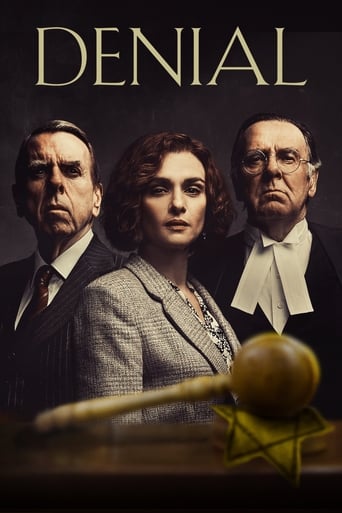kitellis-98121
An extremely well executed drama, without a single pointless or wasted scene. No part of this production drew attention away from the story - which was focused on with laser intensity - so although the cinematography was excellent and atmospheric, there was no flashy camerawork or eye-catching visuals; nor did the music ever overwhelm the dialogue or leave you humming a prominent leitmotif; and the editing was crisp, straightforward, and business-like.The performances were uniformly exquisite, with each actor playing their role with subtlety, nuance, and verisimilitude. There were plenty of opportunities for hammy moments, but to their credit, and the credit of the director, each actor played their part with skilful restraint. In the more emotional scenes, their passions seethed mostly beneath the surface, which all added to the emotional investment of the viewer, forced on occasion to experience the enormity of events far more than if everything had been done for them by the actors. This is a sign of truly skilful and confident directing, as well as a rare example of a modern movie trusting its audience to think and feel what they are meant to, without leading them round by the nose.Overall, this was a thoroughly satisfying viewing experience, that left just the right cocktail of aftertastes on the intellectual/emotional palate.From the number of negative reviews of this film, and its low IMDB rating, I can only conclude that there are still a worrying number of anti-Semites and holocaust deniers out there, as there is very little in it to complain about technically or creatively.
eric-312-417476
What a horribly miscast, pandering, less-than- lifetime-quality mess of a movie.
RW is so awful in this film, and the directing so poor, I don't think anyone could have brought any dignity or believability to this mess.
This obnoxious, self-righteous, narcissistic woman who's "from queens" (just when you thought the film couldn't get any worse, this line rears it's ugly head) Is such a horrible stereotype that she should be on trial herself.
The survivors deserve better and so do the filmgoers.
Now I just have to deny that this movie ever existed.
classicalsteve
"Denial" centers on a Hitler "scholar", David Irving, a British author who has consistently denied the Holocaust, and his lawsuit against American historian Deborah Lipstadt. To be fair, Irving was among several scholars who refuted the authenticity of the so-called "Hitler Diaries" which were revealed by the German periodical "Stern" in the early 1980's. While Irving has brought to light many interesting facts about the Nazis and Adolph Hitler, he has repeatedly stated in his books he doesn't believe the Holocaust occurred on the widespread scale which is generally accepted by mainstream historians. Lipstadt published a book "Denying the Holocaust" in which she refers to how Irving and other deniers misrepresent history and facts to perpetuate their erroneous conclusions about the Holocaust. The trouble is, Irving wants it both ways. He wants to deny the Holocaust and yet be recognized by other scholars and historians. In short, he wants the keys to the academic washroom. He brought the lawsuit against Lipstadt because, in some sense, her books which referred to his denial of the Holocaust as bogus history was denying him the keys to the washroom. Lipstadt is a bona fide and recognized scholar, and her criticisms of Irving deny him entry into the exclusive club. The film is about Irving's attempt to debunk the criticisms of a fellow scholar and in some sense legitimize a debate about whether or not the Nazis systematically gassed Jews and other minorities labeled as "degenerate" by the German government in the late 1930's and 1940's.Timothy Spall in an Academy-Award caliber performance plays David Irving, author and Holocaust denier who sues Deborah Lipstadt (Rachel Weisz). Tom Wilkinson is convincing as Lipstadt's British libel lawyer. The film begins at a lecture concerning the Holocaust offered by Lipstadt and Irving interrupts the proceedings, claiming he has filed a lawsuit against the speaker. Instead of settling out of court, Lipstadt resolves to defend herself. She hires a law firm whose cracker jack defense attorney is Richard Rampton. To prepare, they not only visit one of the Auschwitz camp sites but painstakingly go through Irving's books to see if he uses propaganda and deception to further his assertions that the Holocaust as portrayed by history is a fallacy.An horrific episode in the annals of human history involved Germany whose government was controlled by right-wing radicals, the National Socialist German Workers' Party, better as the Nazi Party, and their supreme leader, Adolph Hitler. The Nazis with Hitler at the helm instigated what is known as the "Final Solution to the Jewish Problem", a systematic extermination of Jews and those of Jewish heritage, defined as an individual as having one grandparent or closer being Jewish. Millions of Jews and other ethnicities such as Gypsies, Poles and other Eastern Europeans were forced into concentration camps where many gassed or suffered other heinous indignations. At the same time, Germany was fighting the Western Allies in the Second World War. When the war ended, many of the camps were liberated, such as those collectively called Auschwitz, and the inmates told horrific stories of unimaginable torture and execution.Over the many decades since the end of the Second World War, there have been a small but vocal group of so-called "historians" who have tried to tell and sell a different picture of the war. They claim the interment and execution of Jews and other ethnicities by the Nazis, called "The Holocaust", did not actually happen. They agree that inmates were interred in camps, but their captivity was intended for expulsion, not for extermination. They refer to the accepted fact of the Holocaust as a large propaganda hoax perpetrated by Jews.
History is not always a pretty picture. But if we deny history, especially the horrific episodes, we deny who we are today and who we can become. While the real Lipstadt did not agree with Germany's government desiring to put Irving in jail for 3 years for denying the Holocaust, it is extremely important that we understand real history to the best of our abilities. We can help prevent a holocaust from occurring in the future only if we acknowledge the reasons for holocausts of the past, which entail knowing and understanding how and why they happened. It is interesting that the Jewish Holocaust and Holocaust Denial seem to have common enemies: Jews. Just about all Holocaust Deniers are Anti-Sematic. Is this a coincidence?
rogerdarlington
When British history writer David Irving sued for libel the American historian and academic Deborah Lipstadt, because she had accused him of being a Holocaust denier, I assumed that he had no chance of winning and that, having been defeated in a court of law, the cause of Holocaust denial would be irredeemably damaged. I was wrong on both scores which is why, 17 years after the trial, it is so important that this big name film about the case has been made.As the film makes clear, Irving's defeat was far from certain because, in an English libel case, the defendant has to prove the veracity of the offending material and an important part of the price paid by the defence was that neither Lipstadt nor Holocaust survivors were called to testify so that Irving, who conducted his own case, could not exploit them. The film is released at a time when social media online and Trump in the White House are giving extraordinary prominence to falsehoods in an era which has been dubbed "post-truth".The Holocaust happened and, if this film helps to remind people of this incontrovertible fact, it will make a valuable contribution to evidence-based discourse. The main problem for such a cinematic work of less than two hours is that the case was so prolonged and complex. It ran for five years (2000-2005) and, when it came to trial, it went on for 32 days and ended with a judgement of 355 pages. A further problem is that the viewer always knows the outcome, which inevitably diminishes the tension of the narrative, although director Mick Jackson and writer David Hare do their best to build up a sense of uncertainty. So, as a film, this is never going to be a crowd-pleaser.But it tells an important story about an issue of huge historical significance and it does it with a roster of fine British actors. Rachel Weisz (herself Jewish) is the feisty Lipstadt and Timothy Spalling is convincing in the unsympathetic role of Irving, while Tom Wilkinson is formidable barrister Richard Rampton and Andrew Scott is cerebral solicitor Anthony Julius. Some of my Jewish friends feel that the film is unfair to the British Jewish community, but a good deal of research went into this work and every word that Irving utters during the screen version of the trial is taken verbatim from the court records.













